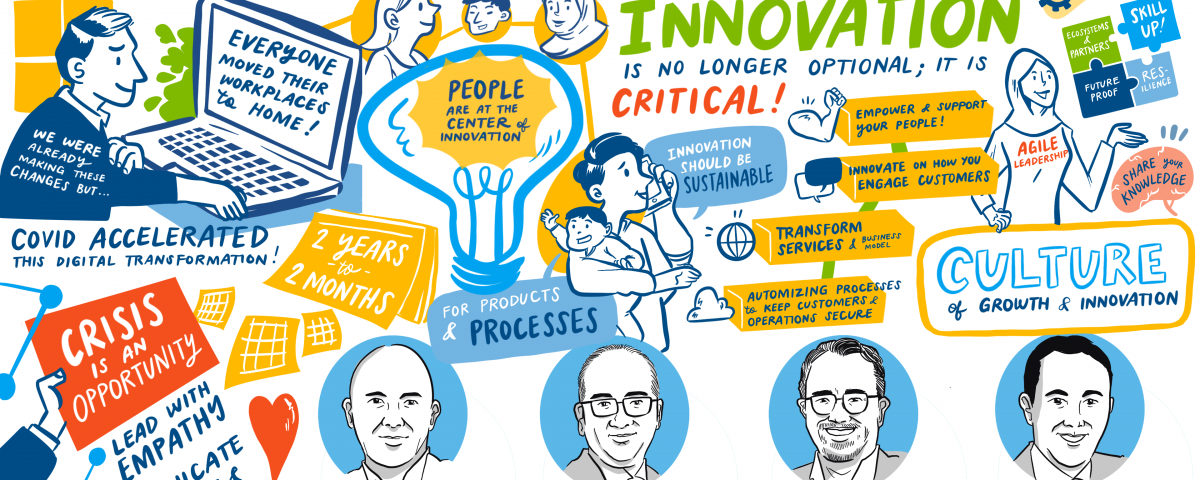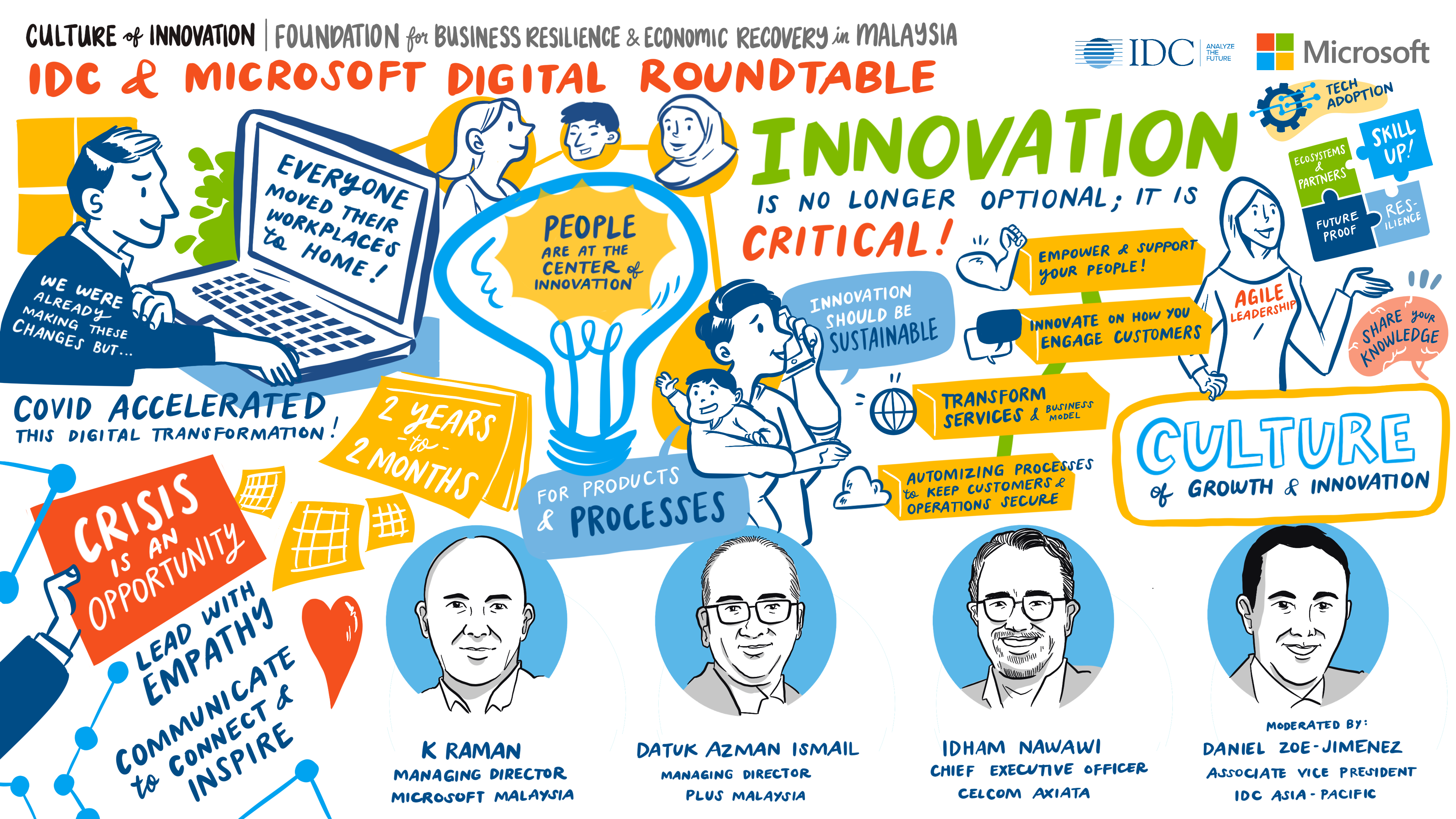
How to Balance IT Stability and Strong Security
March 10, 2021
Threat Trends: DNS Security, Part 1
March 11, 2021A culture of innovation fuels business resilience and economic recovery in Malaysia

- Since COVID-19, Malaysia organizations have matured in a culture of innovation by 12%, similar to the average growth rate for Asia Pacific businesses (11%), according to a Microsoft-IDC study[1]
- 77% of organizations in Malaysia are accelerating the pace of digitalization in response to the crisis, compared with 87% of leaders[2] in Asia Pacific
Malaysia, 10 March 2021 – As Malaysia and Asia Pacific continue to deal with disruptions resulting from the COVID-19 pandemic, 77% of business decision-makers in Malaysia say that innovation is now a ‘must’ for them to respond quickly to market challenges and opportunities, and ensure business resilience.
This is more than average for all organizations in the Asia Pacific region (74%). However, this is still less than Asia Pacific leaders2, or organisations that fall into the most mature stage of the culture of innovation model comprising the areas of people, process, data and technology, where almost all (98%) agree that innovation is a necessity to staying resilient during a crisis.
In the span of six months since COVID-19, the proportion of businesses in Malaysia who are leaders2 increased to almost 1% from 0% before COVID-19. Overall, Malaysia organizations overall have matured in culture of innovation by 12%. Additionally, 77% of Malaysia organizations are speeding up digitalization in a variety of ways to adapt to the new reality – from launching digital products and introducing digital payments to embracing ecommerce and automation; this is compared to 87% of leaders2 who will do the same.
These were some of the findings from the Asia-Pacific-wide, Microsoft-commissioned IDC study, “Culture of Innovation: Foundation for business resilience and economic recovery in Asia”, which was presented recently at Microsoft Malaysia’s Culture of Innovation Digital Roundtable. Panellists included K Raman, Managing Director of Microsoft Malaysia; Daniel-Zoe-Jimenez, Associate Vice-President of International Data Corporation (IDC); Mohamad Idham Nawawi, Chief Executive Officer of Celcom Axiata Bhd; and Datuk Azman Ismail, Chief Executive Officer of Plus Malaysia.

“Organizations in Malaysia have realized how much their ability to innovate fuels their performance and business resilience during the crisis. Since COVID-19, 65% of organizations in Malaysia, similar to leaders across Asia Pacific (64%), have found innovation to be easier. This demonstrates how firms in Malaysia are embracing a culture of innovation to become more mature and accelerate their transformation,” said Jimenez.
The study surveyed 223 business decision-makers and 212 workers in Malaysia within a 6-month period, before and since COVID-19. The Malaysia study was part of a broader survey among 3,312 business decision-makers and 3,495 workers across 15 markets in Asia Pacific conducted over the same time period.
Assessing organizational maturity for culture of innovation
The study introduced the culture of innovation framework, which captures organizations’ approach to innovation. Through the research, organizations’ maturity was mapped against four dimensions – people, processes, data and technology. As a result, organizations were grouped into four stages – traditionalist (stage 1), novice (stage 2), adaptor (stage 3) and leaders (stage 4). Leaders comprise organizations that are the most mature in building a culture of innovation[3].

The study found that in the span of six months, organizations in Malaysia have matured in a culture of innovation by 12%, an indication that they have increased their ability to innovate. In comparison, organizations in Asia Pacific saw an 11% growth in culture of innovation maturity.
The share of Malaysia organizations in the traditionalist stage has fallen from 60% to 46%, while the proportion of novices have seen positive growth from 39% to 51%. The proportion of adopters, while low, has doubled (0.9% to 1.7%), and Malaysia organizations now have close to 1% of organizations that are leaders, from none pre-COVID.

Demonstrating their stronger propensity for resilience and adaptability, 34% more leaders in Asia Pacific, as compared with organizations in Malaysia, expect an increase in their revenue and one in three of them expect to increase their market share despite the crisis.
The study also revealed that while significantly more organizations in Malaysia found innovation to be hard (76%), compared with Asia Pacific leaders (68%) before COVID-19. However, Malaysian organisations have since changed perceptions with significantly fewer organizations (35%) and leaders (36%) having this sentiment now. This is because they were forced to accelerate innovation in response to the disruptions in the market.
Moving forward, organizations in Malaysia say they will prioritise rethinking their current business models, while leaders plan to focus on investing in technology infrastructure that is robust and allows scalability and flexibility.
“We see amongst leaders a constant appetite for growth and evolution. During COVID-19, 45% of them said they think their business model will lose competitiveness in five years’ time, as compared to 28% of firms in Malaysia. This desire and urgency for continuous improvement through agility and adaptation to change will determine the success of businesses in this new normal,” said Jimenez.
Focus on people and technology in Malaysia
People and technology were found to be the weakest dimensions of the culture of innovation for organizations in Malaysia. When asked about their priorities for the next 12 months, they indicated that they will prioritize the same areas of people (27%) and technology (44%) as the most essential for business resilience and recovery.

“It is encouraging to see business leaders in Malaysia recognize that focus on people and culture, in addition to technology, is crucial to drive sustained innovation and realize the digital transformation ambition” Raman added. “Achieving success in digital transformation requires both the adoption of tools and technologies as well as own people’s capabilities – what we term as tech intensity – a critical component of the culture of innovation.”
Culture of innovation – a success formula for resilience and faster economic recovery
Using the culture of innovation framework, the study revealed the best practices that organizations can adopt to progress across people, technology, data and process. Specifically, organizations are encouraged to:
1. Fortify resilience with technology
Strengthen the organization’s approach to digital transformation through resilient technologies allowing simplification, flexibility and agility – cloud, artificial intelligence and machine learning. At the same time, ensure that cybersecurity is infused into the organization’s digital footprint.
2. Invest in people’s capabilities and skills
Create an open and inclusive environment to attract the best and diverse talent. Integrate workplace innovation efforts that will be crucial to accelerate transformation, ensuring the right rewards and incentives to encourage innovation and upskilling to sustain the pace of innovation, by unlocking people’s capabilities.
3. Leverage data to increase competitiveness
Capitalize on the value of data through developing new data-driven products and services and revenue streams for an organization’s competitiveness. It will be key that data-driven insights are leveraged for enterprise-wide collaboration and decision-making to institute a knowledge-sharing culture.
4. Redesign processes to empower people to continuously drive innovation
Create a systematic approach to drive innovation – from ideation to commercialization and establish a centralized digital transformation budget, along with digital KPIs. Customer centricity should be at the heart of continuous improvements, and a feedback loop is necessary to capture learnings on an ongoing basis.
“It’s imperative that people are equipped to collaborate and encouraged to drive sustained innovation. Our goal is to realize an inclusive future where all organizations in Malaysia are dynamic and resilient – to recover well and thrive despite the crisis. At Microsoft, we are committed to working with organizations in Malaysia to make this happen, together,” concluded Raman.
[1] Research background for Culture of Innovation: Foundation for business resilience and economic recovery in Asia Pacific:
- The study was conducted in two phases – Phase 1 (Pre-COVID; Dec 2019-Jan 2020) and Phase 2 (Since COVID-19; July 2020). Phase 1 – 1,622 business leaders and 1,823 workers (108 business leaders and 104 workers in Malaysia) participated; Phase 2 – 1,690 business leaders and 1,672 workers (115 business leaders and 108 workers in Malaysia) participated. Participants from organizations with more than 250 staff were polled.
- 15 Asia Pacific markets were involved: Australia, China, Hong Kong, Indonesia, India, Japan, Korea, Philippines, Malaysia, New Zealand, Singapore, Sri Lanka, Taiwan, Thailand, and Vietnam.
[2] Leaders, or leading organizations, comprise 8% of all organizations surveyed – they fall into the most mature stage (Stage 4) of the culture of innovation model comprising the areas of people, process, data and technology
[3] Please refer below for the full framework


